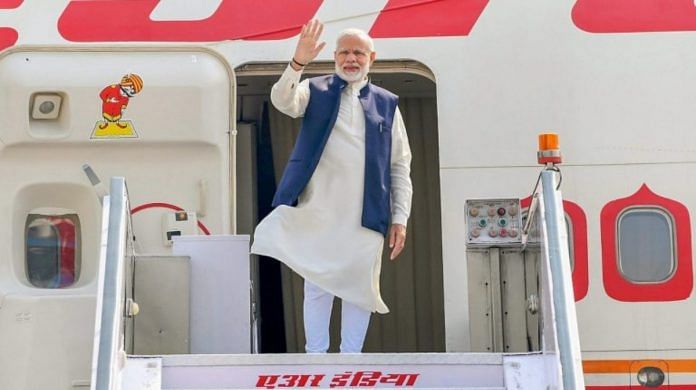New Delhi: The Indian Air Force (IAF) moved a plea in the Delhi High Court on Wednesday challenging a Central Information Commission (CIC) direction to provide information regarding Special Flight Returns (SRF)-II, saying it relates to details of the Prime Minister’s security apparatus and cannot be provided.
The IAF plea has claimed that the “information so sought includes details related to the entire entourage, names of Special Protection Group (SPG) personnel accompanying the Prime Minister of India on foreign tours for his personal safety, and the same, if disclosed, can potentially affect the sovereignty and integrity of India, the security, strategic, scientific or economic interests of the State”.
The petition, filed through central government senior panel counsel Rahul Sharma and advocate C K Bhatt, is in appeal against the CIC’s July 8 direction to IAF to provide certified copies of available and relevant Special Flight Returns-ll to RTI applicant Commodore (retd) Lokesh K Batra.
Batra had sought certified copies of SRF-I and SRF-II with regard to each foreign visit of former PM Manmohan Singh as also Prime Minister Narendera Modi from April 2013 onwards.
IAF, in its plea, claims that the CIC has “failed to appreciate and consider that the information sought by the respondent (Batra) from the petitioner (Air Force) cannot be disclosed and the application of the respondent for seeking the same ought not to have been allowed as the information sought is extremely sensitive in nature…”
The petition contends that the SRF copies sought relate to “official records of functioning and working of the security apparatus of the Prime Minister of India which cannot be brought in public domain for safety and security reasons”.
The matter is likely to come up for hearing on Friday.
Also read: There should be no construction work on Central Vista until judgment on pleas — SC to govt




On 06/07/2012 former information commissioner Shailesh Gandhi posted on FB: I retired today as CIC.
My scorecard :Cases disposed 20279; Penalties 520; Amount 96 lacs; Amounts recovered 59.6 lacs; Tenure 3 years 9 months
And Shailesh Gandhi was one rare RTI activist who got the opportunity to enforce the RTI Act as an IC. I still quote one of his decisions in the matter of Sec 6(3) of the RTI Act which mandates that when an information sought is not held with a public authority that has received the application, it is required to transfer that application to other public authorities. Since the wording of the section is singular it was being exploited by the public authorities to harass and/or deny information to the applicants. Shailesh Gandhi’s decision, that the application should be transferred to as many public authorities as are required, was made on a detailed analysis of the provisions of the General Clauses Act and apex court judgments. But in spite of bringing this decision to the notice of the ex CIC of Kerala State Information Commission, Vinson M Paul (a former DGP and Director of the Vigilance and Anti Corruption Bureau of Kerala) he had been going around telling public authorities that they need to transfer the application to only one another public authority and worse, if the public authority did not know whom to transfer it to it can simply inform the applicant to send a fresh application to the concerned public authority.
But that is not all. I myself had a 2nd appeal being decided by Shailesh Gandhi. It was about the status of four 2nd appeals pending with the Central Information Commission. I did not get any information. In fact the 1st appellate authority had directed the public information officer to make a detailed search and provide the information. But that had also drawn a blank. But Shailesh Gandhi’s decision was nothing short of treason. He had dismissed the appeal stating that all ‘available’ information had been provided.
I know that Sec 219 of the IPC provides for ‘whoever being a public servant, corruptly or maliciously makes or pronounces in any stage of a judicial proceeding, any report, or order verdict, or decision which he knows to be contrary to law shall be punished with imprisonment of either description for a term which may extent to seven years or with fine or with both.’ And the cases under the RTI Act should not take more than one day to dispose of. But then who doesn’t know that approaching the judiciary for redressal of grievances is like jumping from the frying pan into the fire?
The purpose of writing this long comment is only to expose the failure of our systems to address basic issues. In the current case, we , the People, definitely have a right to know the cost of our Prime Minister’s visits abroad. We are also informed through media that the current PM has cut down on a lot of baggage, in terms of media persons and relations accompanying public servants going abroad. So , the kind of information being sought, as brought out in this report, can easily be recognized as merely sensationalizing issues for sensationalization sake.